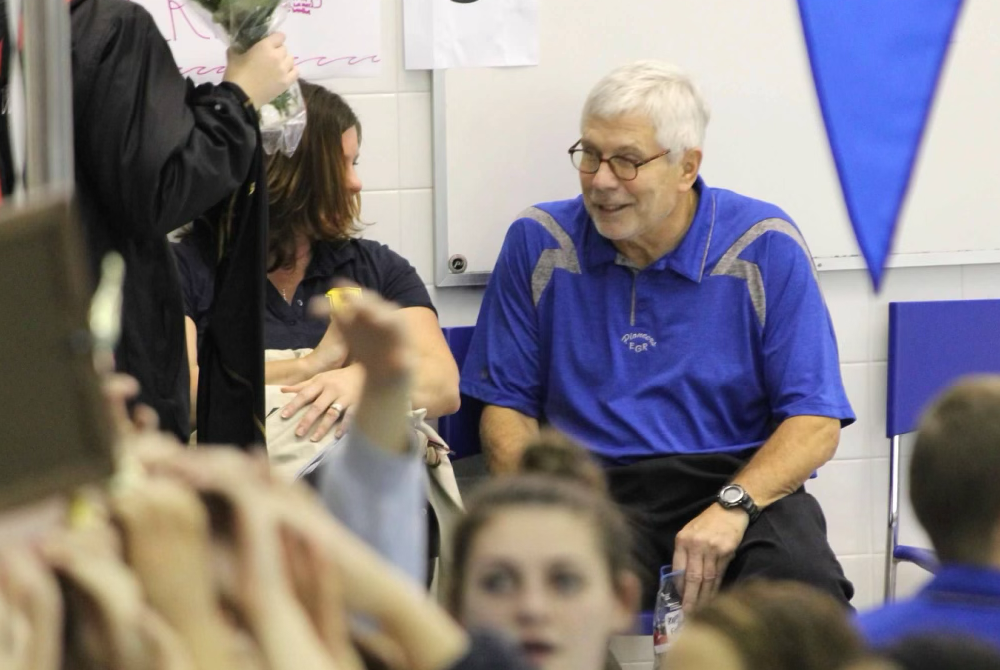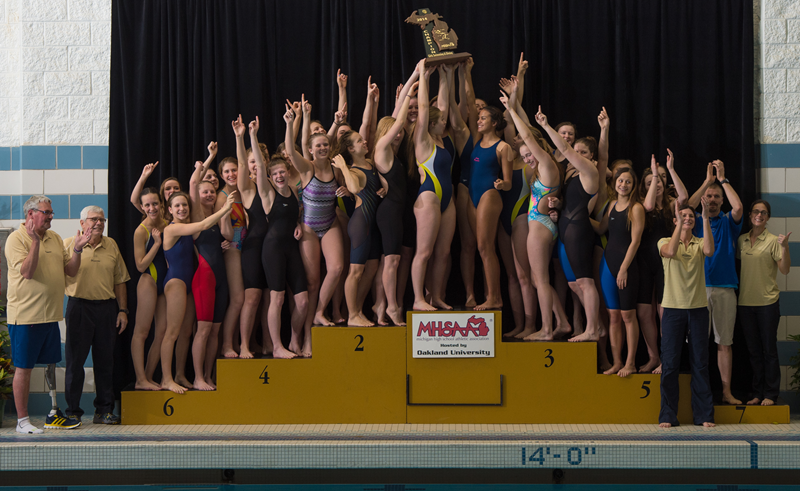
Casting Lines for Future Tournaments
August 12, 2016
By Jack Roberts
MHSAA Executive Director
The MHSAA is best known to the public for the tournaments it conducts to conclude the fall, winter and spring seasons each school year.
These tournaments, the first and largest program of the MHSAA, have survived the Vietnam War, the Korean conflict and two World Wars. They have survived the technology bubble, the housing collapse, the energy crisis and the Great Depression.
MHSAA tournaments existed at the dawn of aviation and at the time of our nation’s lunar landing. Popes, presidents and governors have changed and changed again and again, and MHSAA tournaments roll on year after year.
But the sense of tradition and permanence and inevitability of MHSAA tournaments doesn’t dissuade us from asking questions about our tournaments, even some of the most basic questions. Here are two.
Question #1
I have long been and will always be an advocate for a Ryder Cup format for the MHSAA Golf Finals, and a team tennis approach to the MHSAA Tennis Finals; but 90 years of tradition is hard to overcome. Might this be a more exciting format? Could it be co-ed? Could it reverse the decline in boys tennis participation, and increase girls golf participation? Wouldn’t it be fun to try?
Periodically, the International Olympic Committee requires each of the designated Olympic sports to defend its status, to state its case why the sport should remain a part of the Olympic program. Then, after a series or votes that retain one sport at a time, the IOC drops the sport that makes the weakest case. It does so to make room for one of the previously unlisted sports that makes the best case for inclusion.
This would appear to keep the existing Olympic sports on their toes, and to keep the Olympic movement fresh and reflective of modern trends in sports.
While I would not enjoy the controversy, I can see the potential for some positive results if the MHSAA were to invoke the same policy for determining the 14 tournaments it will provide for girls and the 14 for boys.
This might cause us to consider more deeply what a high school sport should look like, or at least what an MHSAA tournament sport should stand for.
On the one hand, we might be inclined to drop tournaments for those sports that involve mostly non-faculty coaches and non-school venues, or require cooperative programs to generate enough participants to support a team, or resort almost entirely to non-school funding, or cater to individuals more than teams.
Or perhaps this process would cause policymakers to forget traditional thinking and ask: “In this day and age, should we shake off traditional notions of sport and consider more where modern kids are coming from?” That might mean fewer team sports and more individual sports, more “extreme” sports like snowboarding and skateboarding, and more lifetime sports, meaning not just golf and tennis and running sports, but also fishing and even shooting sports.
Currently, MHSAA policy states that the MHSAA will consider sponsorship of a tournament series for any sport which 64 member schools conduct on an interscholastic basis as a result of action by the governing boards of those schools.
Should the only question be how many schools sponsor a sport, or must an activity also have certain qualities and/or avoid certain “defects?” What should an MHSAA tournament sport look like and stand for?
Question #2
Bristling from criticism that his association is a money-grabbing exploiter of children, my counterpart in another state said, “If we were running our programs just to make money, we would do very many things very differently.” I knew exactly what he meant.
Because we care about the health and welfare of students, because we mean what we say that the athletic program needs to maximize the ways it enhances the school experience while minimizing academic conflicts, and because we try to model our claim that no sport is a minor sport when it comes to its potential to teach young people life lessons, we operate our programs in ways that make promoters, marketers and business entrepreneurs laugh, cry or cringe.
If money were the only object, we would seed and select sites to assure the teams that attracted the most spectators had the best chance to advance in our tournaments, regardless of the travel for any team or its fan base. If money were the only object, we would never schedule two tournaments to overlap and compete for public attention, much less tolerate three or four overlapping events. If money were the only object, we would allow signage like NASCAR events and promotions like minor league baseball games.
Those approaches to event sponsorship may not be all wrong; they’re just not all right for us. And we will live with the consequences of our belief system.
During a typical school year, more than 20 percent of the MHSAA’s 2,097 District, Regional and Final tournaments lose money. Not a single site in golf, skiing or tennis makes a single penny. In no sport did every District, Regional and Final site have revenue in excess of direct expenses.
In fact, in only three sports – boys and girls basketball and football – is revenue so much greater than direct expenses overall that it helps to pay for all the other tournaments in which the MHSAA invests.
That’s right: invests. When we present our budget to our board, we talk about the MHSAA’s investment in providing tournament opportunities in all those sports and all those places that cannot sustain the cost of those events on their own. How much is this investment worth to students, schools and society?
These two are core questions that require our focus far in advance of talk about scheduling, site selection, seeding and the myriad matters that too often hijack our time and attention.

East Grand Rapids' Briggs to Receive Deserved Spotlight for Half-Century of Swim
By
Dean Holzwarth
Special for MHSAA.com
May 17, 2024
EAST GRAND RAPIDS – When the idea was presented to celebrate his coaching milestone, Milton “Butch” Briggs balked at it.
 The longtime East Grand Rapids swimming & diving coach doesn’t like to be the center of attention, although his teams certainly have been over the last 50 years as he’s established a pair of perennial state powerhouses.
The longtime East Grand Rapids swimming & diving coach doesn’t like to be the center of attention, although his teams certainly have been over the last 50 years as he’s established a pair of perennial state powerhouses.
“He vehemently said, ‘No, we’re not doing this,’” Pioneers assistant girls coach Gwen Barnes said. “But it’s going to be super cool and so deserving. We need to mark this occasion as a community and swimming community. He has influenced so many people and been an active member of the community for a long time.”
On Saturday, the East Grand Rapids Community Foundation and Alumni Association will commemorate Briggs and his 50 years of coaching at the school.
Briggs took over the East Grand Rapids boys swimming & diving program for the 1972-73 season, and the girls program beginning in the fall of 1974. He has coached 102 seasons total, winning 26 MHSAA Finals championships with the girls and 12 with the boys.
Briggs has always wanted the focus to be on his teams rather than himself.
“He is not one who likes the spotlight,” retired Pioneers athletic director Tim Johnston said. “He is a very private man, but it is awesome that this group of alumni, swimmers and parents want to celebrate him.
“He is one of the best coaches I have ever had the opportunity to work with, but to be completely honest, he is a better person and more than just a coach. That is the truth.”
Past EGR swimmer Kris Ward was a member of the first girls state championship team in 1978.
“He had a huge impact on me,” Ward said. “Just from understanding hard work and dedication and being part of a team. Then following it through. He worked with a variety of people on the team and helped us to come together. It was all about life lessons, and he's teaching the kids that while still being successful.”
Briggs also coached Ward’s daughters Alex, Ashley and Abby.
“He was always about connecting with the kids,” Ward said. “My kids were all able to swim for him, and so I had that experience with him in a different way and seeing how he was with all of my girls on the team.
“He starts with connecting with one person and carries that through to make the success better.”
 Barnes, an assistant coach for the girls team the past three years, also swam under Briggs from 1984-87.
Barnes, an assistant coach for the girls team the past three years, also swam under Briggs from 1984-87.
Her teams won four straight Finals championships and never lost a dual meet.
“There were high expectations for us, and despite them being unspoken, we felt it,” Barnes said. “We wanted and felt this desire to do our best on that team each year, and he instilled this culture of commitment and hard work. Every swimmer had different abilities, but he was able to tap into getting us to do our best.”
Barnes has gained a different perspective of Briggs as his assistant.
While she noted that he still displays the same traits as far as his demeanor, sense of humor, kindness and patience, his devotion to the program and his student-athletes also has never wavered.
“Coaching with him as an assistant, you see how much work and time he puts in that goes unnoticed sometimes,” Barnes said. “To maintain that level of commitment for 50 years is pretty remarkable, and he still has this presence when on the pool deck that challenges everybody to do their best. He set the same standard for everyone, and everyone on the team feels important, which I think is cool.
“He weaves in a lot of stories and lessons from over the years and maintains traditions that I think make current teams feel like they are a part of and building onto the history.”
Briggs, who played football and ran track & field in high school, was inducted into the Grand Rapids Hall of Fame in 2009. The EGR natatorium was named after him in 2014.
Briggs, who taught at Ottawa Hills High School, has received national attention, too. In June 2020, he was named National Girls Swim Coach of the Year by the National Federation of State High School Associations (NFHS) Coaches Association. Briggs had received the same honor in 2011.
He wrote this of his coaching philosophy as part of the nomination for the NFHS girls swimming award:
“My coaching philosophy has been, and continues to be, a work in progress. I have formed relationships with hundreds of amazing young people. They have taught me life lessons in real time and real situations. As a neophyte coach, the experience revolved around winning. We worked together as a team, supported each other in and out of the pool, and won often. Thankfully, I became aware of the value within each athlete. Today, I attempt to interact with each athlete at every team activity and follow their progress in non-swimming endeavors. In short, when I removed my ego from the team's expectations and outcomes, the entire atmosphere was much more enjoyable and productive. And we are still capable of being successful. The Lord has put me in the right place at the right time.”
Ward said she expects about 200 people to attend Saturday’s celebration.
“He has impacted so many people in the swimming community, and there is something special in what he has created,” Ward said. “All of the kids on the current teams and their families will be there, as well as a lot of different generations. I also know that there will be people coming from far away.”
As far as Briggs’ future, Barnes doesn’t see him stepping down any time soon.
“I don’t really ever see him stopping,” she said. “His passion is EGR swim, and I think he will continue to be a part of the program as he can and wants to be.”
 Dean Holzwarth has covered primarily high school sports for Grand Rapids-based WOOD-TV for five years after serving at the Grand Rapids Press and MLive for 16 years along with shorter stints at the Ionia Sentinel and WZZM. Contact him at [email protected] with story ideas for Allegan, Kent and Ottawa counties.
Dean Holzwarth has covered primarily high school sports for Grand Rapids-based WOOD-TV for five years after serving at the Grand Rapids Press and MLive for 16 years along with shorter stints at the Ionia Sentinel and WZZM. Contact him at [email protected] with story ideas for Allegan, Kent and Ottawa counties.
PHOTOS (Top) Longtime East Grand Rapids swimming coach Butch Briggs, right, will be celebrated this weekend for his half-century of coaching the Pioneers. (Middle) Briggs, second from far left, celebrates the 2014 Lower Peninsula Division 3 championship with his girls team. (Top photo by Kris Ward; middle photo by High School Sports Scene.)

